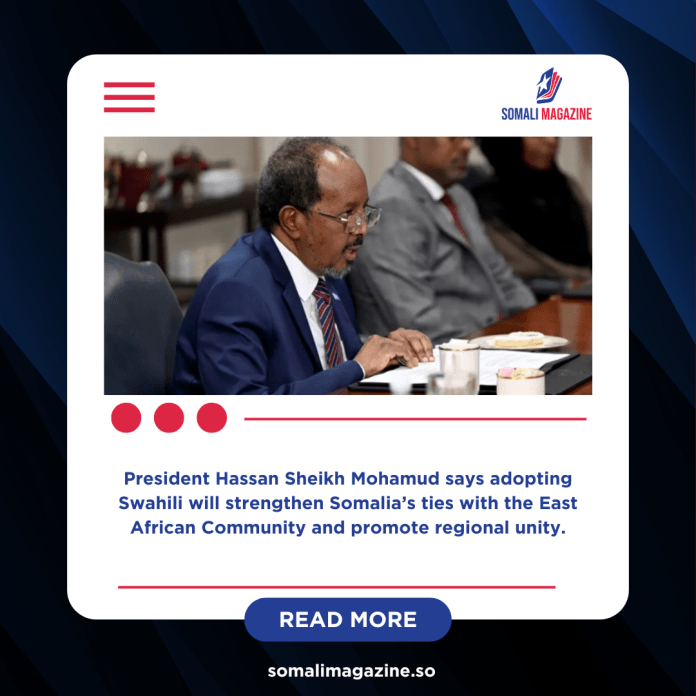Facebook Twitter (X) Instagram Somali Magazine - People's Magazine
Somalia has announced plans to introduce the Swahili language into its education system as part of efforts to strengthen its integration within the East African Community (EAC). President Hassan Sheikh Mohamud made the declaration on Tuesday during an EAC summit held in Mogadishu, saying Swahili will be taught in schools and universities alongside the country’s existing official languages — Somali, Arabic, and English.
President Mohamud said the decision marks a new chapter for Somalia as it deepens ties with the East African bloc, which recognizes Swahili as one of its official languages. He noted that language is an important tool for regional cooperation and that Somalia’s adoption of Swahili reflects its commitment to becoming an active and connected member of the EAC. “Somalia wears many different hats,” the president said, highlighting that the country had embraced Arabic when it joined the Arab League in 1974 and had since incorporated English into its education system. “Now that we are part of the East African Community, it is natural for us to also embrace Swahili — the language of East Africa,” he added.
Mohamud encouraged universities, particularly the Somali National University, to take the lead in developing Swahili studies and promoting the language through research, teaching, and cultural exchange. He emphasized that learning Swahili would not only enhance communication with neighboring countries but also expand opportunities for trade, education, and regional collaboration. “Adopting Swahili is important for our integration into the region,” he said.
Somalia joined the EAC in early 2024, becoming the eighth member of a bloc that includes Kenya, Tanzania, Uganda, Rwanda, Burundi, South Sudan, and the Democratic Republic of the Congo. The regional organization brings together about 300 million people and promotes trade, free movement, and shared development goals across member states. Swahili serves as a unifying language for the region and is spoken by more than 200 million people worldwide.
For Somalia, the introduction of Swahili represents both a cultural connection and a practical move toward regional inclusion. Historically, Somalia’s language landscape has been shaped by its colonial past and international affiliations. The country, once divided between British and Italian colonial powers, retained both English and Italian influences in the 20th century. However, Italian gradually faded from common use, while Arabic gained prominence through migration and Somalia’s association with the Arab League. English has since become a vital language in education and international communication, especially among young Somalis seeking opportunities abroad.
Although Swahili has not been officially taught in Somalia before, it is familiar to many Somalis who live or work in East African countries such as Kenya and Tanzania. In some southern regions and border communities, Swahili is already used informally in trade and communication. The new plan will make it the first time Swahili receives official recognition and systematic teaching within Somalia’s education system.
Somalia’s Information Minister, Daud Aweis, welcomed the move, saying that Swahili and its traditions are already part of Somalia’s cultural fabric. In a post on X, he noted that Radio Mogadishu had a Swahili segment in the past and that many Somalis speak the language fluently. Similarly, Education Minister Farah Sheikh Abdulkadir said the government hopes Swahili will soon become a central language of communication, trade, and learning within Somalia. “We want to see Swahili become a language of communication, trade, and learning — even replacing English during our next conference,” he said.
By embracing Swahili, Somalia hopes to bridge cultural and linguistic gaps with its East African neighbors, promote regional identity, and enhance economic and educational cooperation. The initiative signals a forward-looking approach that values both national identity and regional unity — a step that could help Somalia strengthen its place in a rapidly integrating East Africa.

